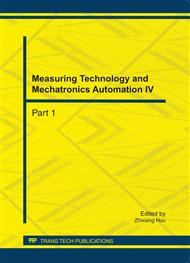p.761
p.765
p.771
p.775
p.780
p.784
p.789
p.794
p.799
A Hybrid Intelligent Excitation Control for Ship Power Station
Abstract:
Hybrid intelligent control technique is used for ship power station synchronous generator excitation control in this paper. The parameters and structure of the excitation controller are learned and adjusted through a hybrid learning algorithm combining self-organizing learning with BP learning. This algorithm converges much faster than original BP learning. Simulation results show that the synchronous generator excitation controller based on the learning algorithm can significantly stabilize terminal voltage.
Info:
Periodical:
Pages:
780-783
Citation:
Online since:
October 2011
Authors:
Price:
Сopyright:
© 2012 Trans Tech Publications Ltd. All Rights Reserved
Share:
Citation:


